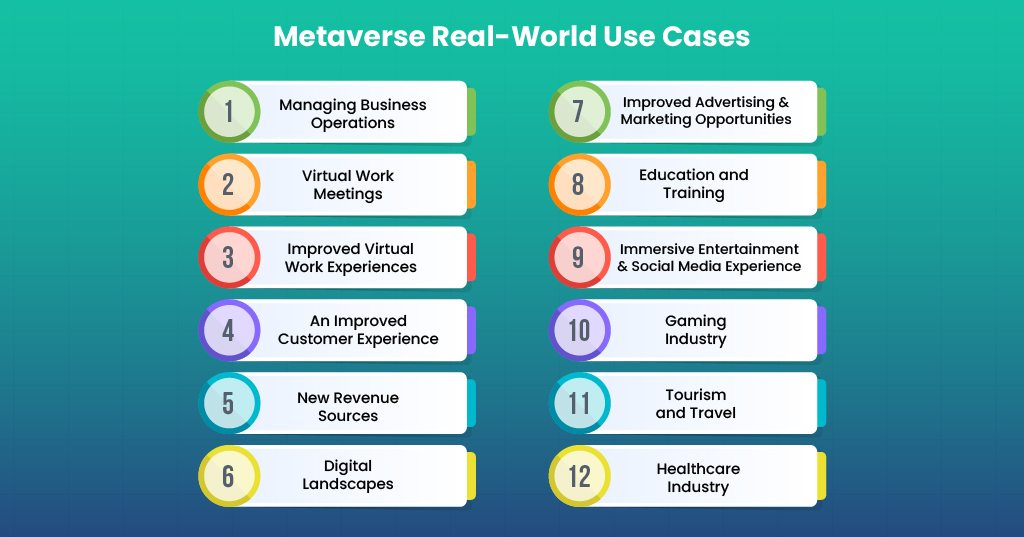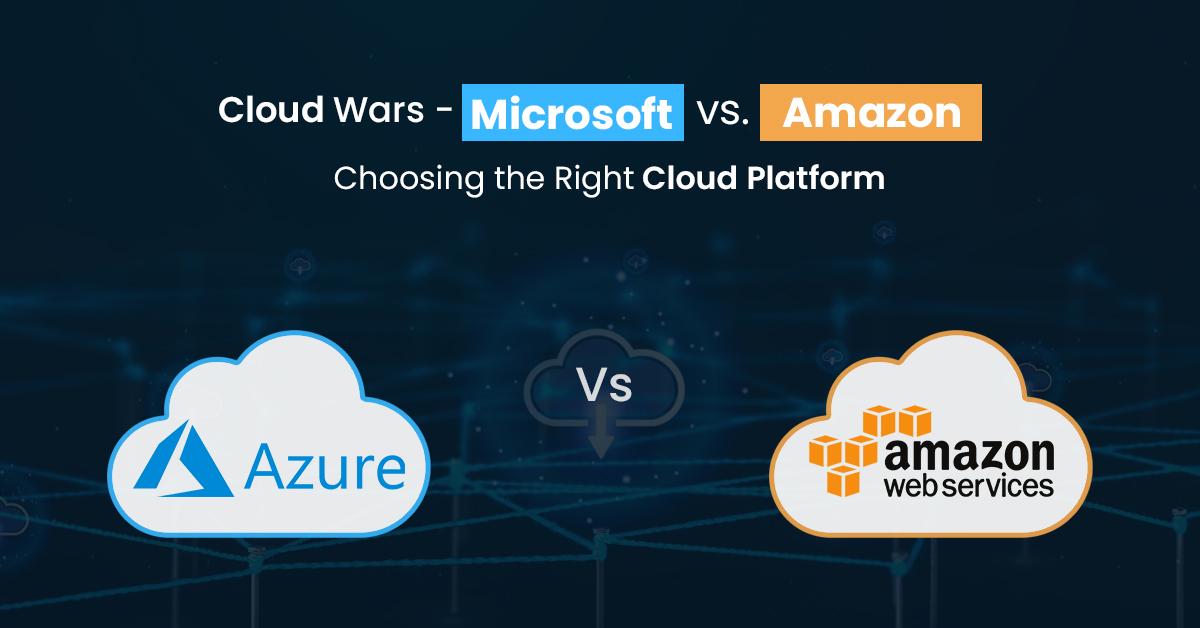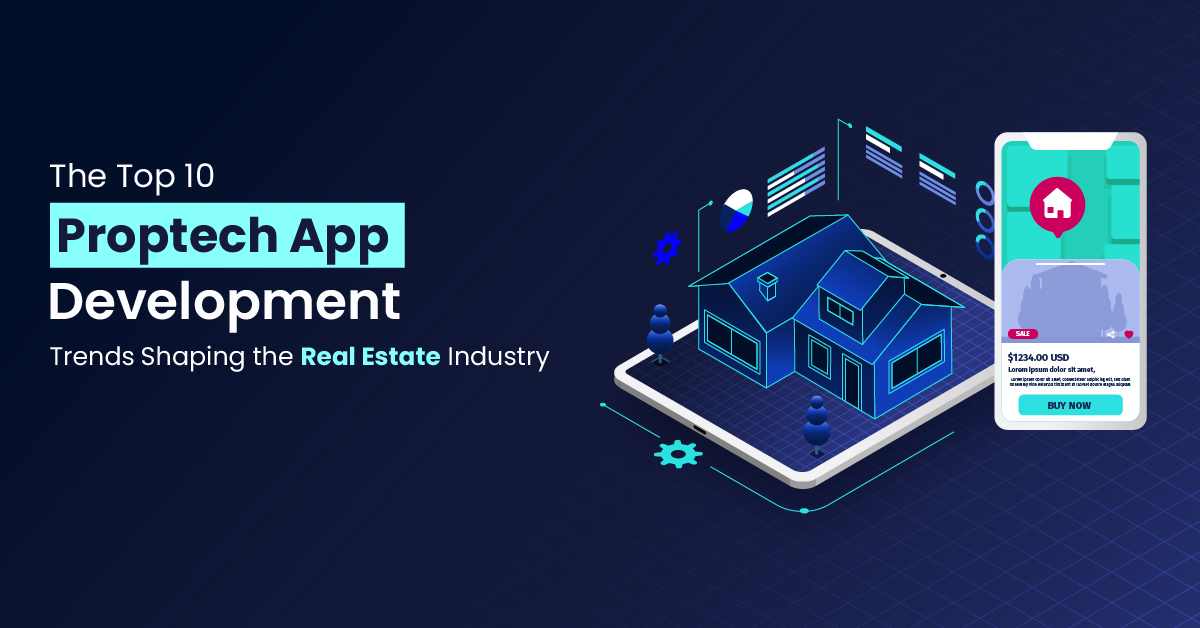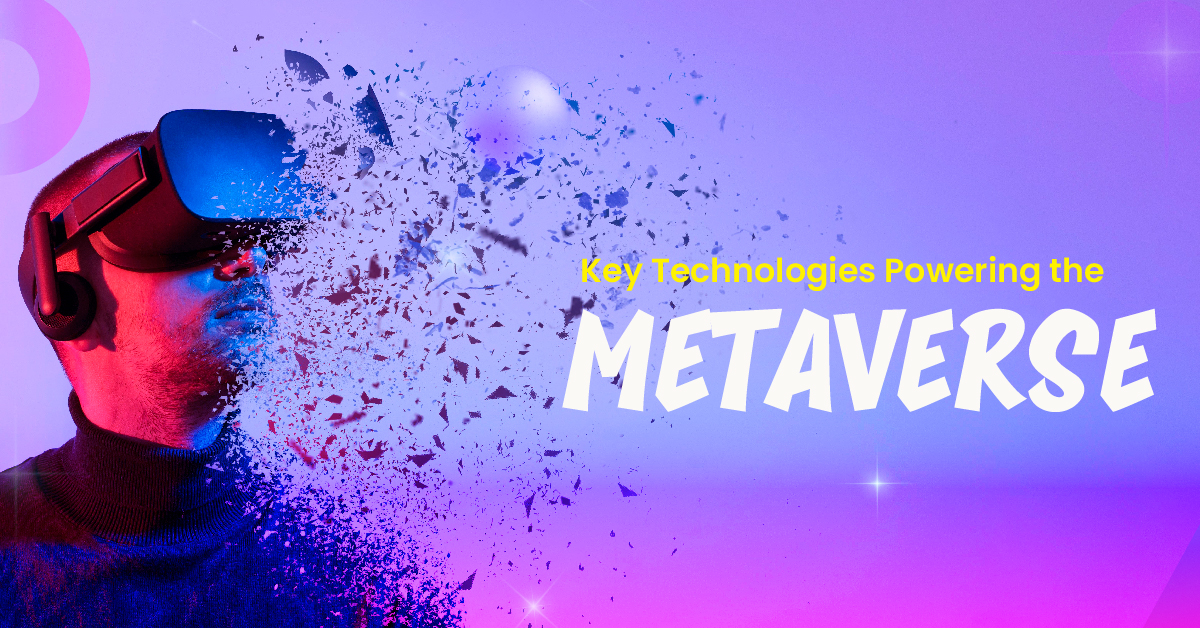List of Real-World Metaverse Use Cases
The metaverse is an exciting new frontier, offering endless possibilities for innovation and creativity. As this technology continues to evolve, it’s being used in various real-world applications, from gaming and entertainment to education and commerce. Discover the potential of this emerging technology and join the journey into the future of virtual worlds.
Metaverse is a decentralized platform offering an innovative way of creating and managing digital assets and identities. It is designed to enable the development of decentralized applications (DApps) and automated services within a virtual space. These are secure, easy to use, and offer an immersive experience to the user. Though relatively new, Metaverse use cases span across a variety of projects and the technology has a strong potential. But it is fair enough to say that we have barely scratched the tip of the iceberg. The concept of a world in which hybrid and digital coexist with fully functional economy has yet to be realized.
However, various organizations have already begun to look for metaverse components. They are exploring every possibility as a means of new revenue sources. Some examples include Extended Reality, Blockchains, NFTs (Non-fungible Tokens), IoT (Internet of Things), and Cloud Technologies. As these emerging technologies interconnect and mature, they will eventually aid in continued exploration in new directions.
Before we get into the real-world applications and benefits of the Metaverse, let’s discuss what it actually is.
Defining Metaverse
The Metaverse is an ever-evolving virtual world where people can explore, interact, and create. It is an expansive and immersive digital space designed to provide users with a secure and efficient platform. They can manage and interact with their digital assets bringing together the best aspects of gaming, social media, and VR.
With its unique combination of interactive elements and user-generated content, Metaverse offers users a new way to experience the world. From exploring vibrant landscapes to crafting unique creations, Metaverse is a place where imagination and creativity come to life.
However, let’s consider its present functionality. Users cannot live, shop, and work in a way that is predicted for the future versions of Metaverse. It is unclear when and how extended reality projects will converge and integrate to form that vision. But as Metaverse matures, it will offer people a platform where they will be able to engage with each other and their surroundings, blurring the lines between reality and the digital world.
So, curious to know its use cases? Let’s dig in.

Metaverse Use Cases
Being the next internet iteration, Metaverse can replicate the real world using cutting-edge technologies, including Augmented Reality and Virtual Reality. Consequently, offering a wide array of business opportunities to enterprises around the globe. Recent research indicates that more than 17% of global IT enterprises have already invested in the Metaverse.
What’s more, Bloomberg’s report predicts the market will grow by approximately $800 billion by 2024. Likewise, Gartner predicts that almost 25% of people will spend at least an hour daily in the Metaverse by 2026. So, whether you are a business owner or a software developer, there are several possibilities to explore.
Here are some enterprise and consumer-focused use cases.
1. Managing Business Operations
Though in its early stages, the Metaverse has caused a significant shift in the traditional business model. Multiple enterprises such as Nike, Disney, Hyundai, Intel, and YouTube are already leveraging Metaverse’s virtual business architecture for improved operations. Not to mention that startups like Upland and Gravity Sketch are also striving to stay ahead of the curve.
Metaverse offers a VR platform where employees can take advantage of simulated experiences to learn and excel. Videos, audios, manuals, and various other digital environments are among the primary benefits of VR training in the Metaverse. They combine the elements of corporate with practical training.
Another important application of the Metaverse when working in a virtual space includes communication and collaboration of the workforce. Individual can use VR devices and their respective 3D avatars to engage in remote meetings effectively
As metaverse technology matures, employees will have a more collaborative environment to work in, along with access to ubiquitous data. The experience will eventually become much more immersive, providing employees with a platform to learn and engage in the most complex field and service tasks.
2. Virtual Work Meetings
Since the COVID-19 pandemic struck, there has been a gradual shift from conducting in-person meetings to remote ones; take Zoom meetings, for example. Considering this as a stepping stone for virtual meetings, organizations focused on metaverse development, such as Microsoft and Meta, have taken things to the next level.
Within a year or two, people will use their avatars to interact with each other. This will eventually shift shifting virtual meetings from 2D camera grids to 3D world. The digital avatars will offer an immersive experience, replicating the feeling of being actually present in a meeting room. This will necessitate using virtual reality (VR) goggles and motion capture gloves to render expressions, body language, and the quality of other people’s voices.
What’s more, these tools will extend employees’ reach, enabling them to engage and execute tasks virtually while simultaneously interacting with individuals around the globe. They will be able to manage multiple tasks and plan for any situation.
3. Improved Virtual Work Experiences
Another promising business-focused Metaverse use case is that employees can perform their jobs effectively and efficiently utilizing augmented reality. Although in its present state, the Metaverse lacks interoperability, as it matures, it will ultimately provide people with a platform to collaborate and share information at runtime.
For example, in a fully developed version of the Metaverse, employees will have access to important information, such as a particular city’s infrastructure or a building, through the digital overlay of the physical world. Using this information, they will be able to make runtime changes while simultaneously communicating them among their community for maximum productivity.
4. An Improved Customer Experience
In addition to improved employee experiences, Metaverse is equally effective in helping organizations deliver an enhanced customer experience which is one of the most effective Metaverse use cases. It has the potential to completely transform the way organizations interact with their customers. Businesses can deliver new experiences while simultaneously providing information in new ways, utilizing extended reality platforms.
For example, automotive industries could offer their customers test drives in an extended reality setting. Likewise, a tour company could effectively utilize the technology to deliver an immersive experience to their customers in a virtual realm by taking them to exotic locations.
5. New Revenue Sources
When talking about Metaverse use cases, let’s not forget that it does pretty well in generating new revenue sources. How you might wonder? Well, multiple companies such as Gucci, Nike, and Ralph Lauren are already selling their products and services that are only available in the digital world. Gucci has partnered with Superplastic, a product, and entertainment company, to create collectible Non-fungible tokens (NFTs).
Similarly, Ralph Lauren sells avatar clothing, while Nike is focuses on creating a Non-fungible token (NFT) linking to its real-world counterpart. Additionally, renowned fashion brands are selling exclusive digital products paving the way for future opportunities for broader business landscapes. These digital assets have the potential to become the next big opportunity for many companies.
6. Metaverse Use Cases Associated with Real Estate
Metaverse focuses on delivering an ultimate virtual reality experience to its users. Its applications not only include collectible NFTs, clothing items, or accessories, but digital locations also carry significant importance. So, it is fair enough to say that real estate is a lucrative market niche for Metaverse.
Digital representations of real estate are being rigorously explored by early adopters of the Metaverse. Likewise, investors are focusing on obtaining digital properties, such as shopping malls, concert venues, and more, in the Metaverse.
With Metaverse, neither the realtor nor the clients need to visit the site physically. Clients can take a tour of multiple locations in real time while ensuring that the tour is well adapted to their standards. Big names such as Roblox and Minecraft are already focusing on creating an environment where they can easily connect with their consumers.
A restaurant, for example, is one of the most practical applications. People working, playing, or exploring the digital world will have the privilege of walking straight into the virtual restaurant, ordering their favorite for a real-world pickup or a delivery to their doorstep. Utilizing Web 3.0, a restaurant could create a seamless experience for consumers where they can earn loyalty points and later use them to pay for the food, which will also be easy for the company to track.
Parade has gone a step further in utilizing the power of Metaverse and has moved the farmers market concept into the Metaverse. It listed its headquarters as Metaverse on its LinkedIn profile, describing its MetaMarket as the pioneer of the farmers market in the Metaverse. About 500 customers in this market interact with each other and buy products as digital avatars.
7. Improved Advertising and Marketing Opportunities
Like other potential business opportunities, the Metaverse is a game changer in advertising and marketing. A virtual reality setting significantly helps organizations in building an established presence in the Metaverse. Take Hyundai Mobility Adventure as an example.
The company offers a Metaverse experience on Roblox, a gaming platform. Using their avatars, users can experience the present and future Hyundai mobility projects. Experiencing products firsthand in a way that feels almost real works like a charm when it comes to implementing it in your advertising and marketing strategies. Users get to experience how the product might turn out to be, thus increasing customer loyalty, building a positive brand perception, and increasing customer acquisition.
8. Education and Training
When talking about Metaverse use cases, education and training are two of the domains that seem to be among the most promising ones. Most educational institutes have already gone online but what they basically lack is human interaction. In this case, there is no other platform capable of addressing this flaw better than the Metaverse.
With Metaverse, students can take classes in a virtual environment without compromising on the lack of human interaction. They can coordinate with their instructors and engage in discussions with their peers in real time within a virtual space. Students can experience live experiments and have access to high-quality resources.
Metaverse effectively removes any language barriers offering students around the globe with a single digital space to harness their creativity without any social and linguistic complications. Not only this, but with Metaverse, teachers can deliver their lectures creatively and effectively. Utilizing extended reality, they can breathe life into their ideas and practically demonstrate the core concepts.
Moreover, Metaverse is a game changer when it comes to training. You can utilize it to deliver enhanced training instructions. In addition, instructors and students around the globe can meet in Metaverse and go through real-life complex scenarios to improve their overall learning experience. One of the best examples is Microsoft’s Mesh, a mixed-reality platform allowing faculty, staff, and students to interact and present using their 3D avatars.
9. Immersive Entertainment & Social Media Experience
In addition to other industrial applications of the Metaverse, let’s not forget the endless possibilities it offers when it comes to entertainment. From games and movies to live concerts or orchestras, you will have many activities to indulge yourself in and experience things like never before. This opens doors for several organizations to create new user experiences and accelerate their business growth.
Moreover, the concept of Metaverse for Social Media has completely transformed the audiences’ exposure to online entertainment. Users can now communicate with each other using their digital avatars. Come to think of it, Facebook changing its name to Meta indicates that there will be huge business opportunities in the digital media space in the future.
10. Metaverse Use Cases Associated with Gaming Industry
One of the core and primary investors of the Metaverse technology is the gaming industry. Some successful examples of Metaverse operating in the online gaming sector include Sandbox and Axie Infinity. On average, Axie Infinity alone has a massive daily active user base of 350,000 players and around 3 million monthly users.
Moreover, elements such as a fully-fledged social environment, the ability to earn cryptocurrency, compatibility with in-game NFTs, and mixed-reality offer players with a compelling and immersive user experience.
11. Tourism and Travel
With virtual tourism, people can travel to distant exotic locations, which they are otherwise unable to because of financial or physical disabilities, making it yet another innovative Metaverse use case. Creating immersive digital experiences in the Metaverse using Augmented Reality and Virtual Reality is the most significant breakthrough in the travel industry.
You not only have the option of taking a virtual tour of a particular place but can experience them with realistic effects. Say, for example, visiting a historical place and observing historical events coming back to life. How amazing that will be. One of the best present examples include “Try before you Fly,” a virtual reality holiday by Thomas Cook that enables users to travel virtually to their desired locations.
12. Healthcare Industry
Metaverse applications in healthcare have opened doors to new possibilities where delivering treatments is not only cost-effective but has improved positive outcomes. Utilizing Metaverse-powered concepts such as Telehealth and Telemedicine has made it possible for patients and doctors to interact seamlessly in virtual clinics.
Additionally, the new Metaverse applications also include digital workouts and exercises aimed at improving individuals’ health. What’s more, you can utilize a patient’s digital twin to test treatments and medications.
13. Metaverse Use Cases Associated with Blockchain Technology
Blockchain technology has the potential to revolutionize the way we interact with the Metaverse and is crucial for its mass adoption across major industries. Since its decentralized and functions as a distributed ledger, it can enable secure and immutable tracking as well as the recording of peer-to-peer transactions.
In addition, it can also support the creation and tracking of non-fungible tokens (NFTs) like avatars, virtual real estate, and other digital assets. It could also facilitate secure and transparent payments within the Metaverse. Blockchain smart contracts can facilitate the exchange of digital assets and secure virtual real estate ownership.
Moreover, blockchain offers secure platform for building decentralized applications, enabling users to interact with the Metaverse in a trustless manner. What’s more, it will provide a platform for companies to design exciting and realistic NFT marketplaces while simultaneously enabling users to interact with them so that they can make better buying decisions. Furthermore, it is the best technology to work with when it comes to developing next-gen games.
How Can Appricot IT Consultants Help?
With a highly skilled team, Appricot IT Consultants is dedicated to pushing the boundaries of what is possible in Metaverse. Our commitment to excellence and attention to detail is what sets us apart from the competition. We ensure that each and every project we undertake is delivered to the highest standard. Looking for a custom-built virtual world, an immersive gaming experience, or a cutting-edge virtual event platform? We have the expertise and capability to bring your vision to life. With Appricot IT Consultants, you can be confident that you are getting the very best in metaverse services.
Conclusion
Metaverse has immense potential and its use cases span a wide range of industries. From virtual events and training sessions to interactive gaming and virtual worlds, its possibilities are endless. It can revolutionize how users interact with each other while creating a more immersive and engaging experience. However, it is still in its developmental state, but as it matures, it will eventually become an integral part of our daily lives in the near future.
FAQs
What is the Metaverse, and how is it being used in the real world?
The Metaverse is a virtual shared space where users interact with digital environments and each other in real-time. In the real world, the Metaverse is being employed across various industries to revolutionize experiences, enhance collaboration, and create new opportunities.
How is the Metaverse transforming the gaming industry?
The gaming industry is embracing the Metaverse to provide immersive gaming experiences. Players can dive into vast virtual worlds, engage in social gaming, and access user-generated content, taking gaming to a whole new level of interactivity and excitement.
Are there practical applications of the Metaverse in healthcare?
Yes, the Metaverse is making strides in healthcare. Medical professionals can use virtual simulations for training and surgical practice, while patients benefit from telehealth services and therapeutic experiences for mental health support.
Can the Metaverse improve remote collaboration for businesses?
Absolutely! The Metaverse facilitates remote collaboration with virtual meeting spaces, enabling team members from different locations to work together in a lifelike environment, enhancing productivity and fostering creativity.
How does the Metaverse impact the education sector?
In education, the Metaverse brings transformative changes. Virtual classrooms offer interactive learning experiences, historical and scientific simulations enhance understanding, and students can engage in global collaborations, broadening their horizons.
Are there real-world examples of using the Metaverse for architecture and urban planning?
Yes, architects and urban planners are using the Metaverse to visualize and simulate buildings and urban environments. It aids in designing sustainable cities, assessing infrastructure, and getting valuable community feedback.
Can the Metaverse be used for artistic expression and entertainment?
Absolutely! Artists and creators find boundless opportunities in the Metaverse. Virtual galleries showcase artwork, musicians hold live virtual concerts, and filmmakers create immersive experiences for audiences.
What about social interactions and networking in the Metaverse?
The Metaverse enhances social interactions by providing users with virtual spaces to socialize, network, and attend events. It breaks barriers of distance and allows people to connect globally, forming new friendships and professional relationships.
How can I experience the real-world Metaverse use cases firsthand?
Many platforms and apps offer access to the Metaverse’s real-world use cases. From gaming platforms to virtual meeting spaces, educational apps, and artistic exhibitions, you can explore these experiences with a compatible device and an internet connection.
At Appricot IT Consultants
We’re driven by our passion for providing top-tier tech solutions to our clients. Our goal is to ensure that your business thrives in the digital age. Join us on a thrilling journey of innovation and growth, as we work together to unleash the full potential of your enterprise.
Related Articles
Satisfy your cravings for knowledge and inspiration!

Cloud Wars - Microsoft vs. Amazon
Learn about the features and benefits of Microsoft Azure and Amazon Web Services, two leading cloud platforms, to understand how to choose the one that best fits your needs

App Development Trends Shaping Real Estate Industry
From virtual and augmented reality to blockchain and smart contracts, discover the top 10 proptech app development trends that are shaping the future of the real estate industry.

Key Technologies Powering the Metaverse
Explore how top-tier technologies, such as blockchain, cryptocurrency, and NFTs, intertwine to create Metaverse, and how you can benefit from the opportunities they offer
